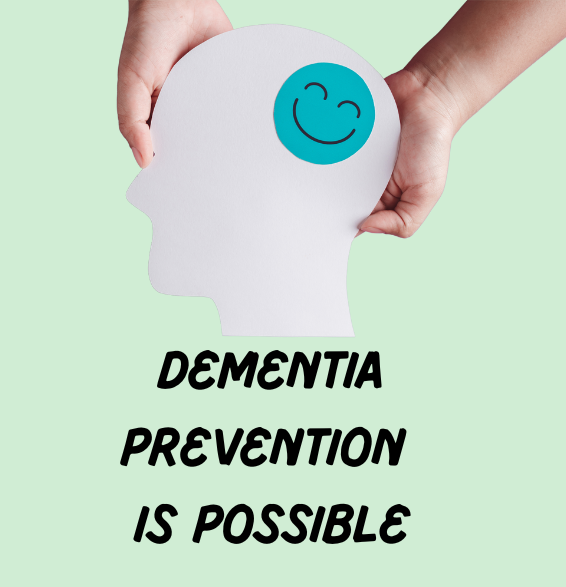Dementia is a word no one wants to hear. The idea of losing memories, struggling with simple tasks, or forgetting the faces of loved ones is downright terrifying. But here’s the truth: dementia is not an inevitable part of aging. While genetics play a role, research shows that up to 40% of dementia cases could be prevented through lifestyle changes.
That’s right—you have more control over your brain health than you might think.
So, what exactly causes dementia? And more importantly, what can you do today to reduce your risk? Let’s dive into the science and uncover six powerful ways to keep your brain sharp and vibrant for years to come.

Understanding Dementia: More Than Just Forgetfulness
Dementia isn’t a single disease—it’s an umbrella term for conditions that cause cognitive decline. Alzheimer’s disease is the most common form, but other types include vascular dementia, Lewy body dementia, and frontotemporal dementia.
The biggest risk factor?
Age. By the time you reach 85, your risk of developing dementia jumps to 1 in 3. And with over 55 million people worldwide currently living with dementia, it’s a growing concern.
But while aging increases the risk, it’s not the only factor at play. Scientists now know that chronic inflammation, poor metabolic health, and vascular issues all contribute to dementia.
Things like poor sleep, stress, diet, and sedentary living can speed up cognitive decline—but they can also be modified.
The good news? What you do today can significantly impact your brain’s future. Let’s explore the six most effective strategies for keeping dementia at bay.

Healthy Eating
1. Fuel Your Brain with the Right Foods
Your diet has a direct impact on brain health. Research consistently shows that the Mediterranean and MIND diets (a hybrid of the Mediterranean and DASH diets) lower the risk of dementia.
✅ Eat more:
- Leafy greens (spinach, kale, arugula)
- Berries (blueberries, strawberries, blackberries)
- Healthy fats (olive oil, avocados, nuts)
- Omega-3-rich fish (salmon, sardines)
🚫 Eat less:
- Processed foods and added sugars
- Fried foods and unhealthy oils
- Excessive red meat and alcohol
Your brain thrives on whole, nutrient-rich foods. Making simple swaps—like trading refined carbs for whole grains—can have a huge impact on memory and cognitive function over time.

2. Get Moving: Exercise Your Brain & Body
Think of exercise as fertilizer for your brain. It increases blood flow, reduces inflammation, and even stimulates new brain cell growth.
✅ Aim for at least 150 minutes of movement per week, whether it’s:
- Walking
- Strength training
- Yoga or Pilates
- Swimming
Even 10-minute movement breaks throughout your day can keep your brain sharp and resilient.

3. Prioritize Quality Sleep
Poor sleep is a huge risk factor for dementia. It increases inflammation and allows toxic proteins like beta-amyloid to build up in the brain—one of the hallmarks of Alzheimer’s disease.
💡 Quick sleep tips:
- Stick to a consistent bedtime ⏳
- Avoid blue light from screens 1-2 hours before bed 📱❌
- Limit caffeine in the afternoon ☕
- Create a cool, dark, and quiet sleep environment 🌙
If you struggle with sleep despite good habits, consider getting tested for sleep apnea, which is strongly linked to dementia.

4. Reduce Stress & Protect Your Mental Well-Being
Chronic stress wreaks havoc on the brain. It triggers the release of cortisol, a stress hormone that—when elevated for too long—shrinks the hippocampus, the brain region responsible for memory.
Simple ways to manage stress daily:
- Practice deep breathing
- Try mindfulness or meditation for 5-10 minutes a day
- Spend time in nature
- Engage in hobbies that bring you joy
- Connect with loved ones
Managing stress isn’t just good for your mental health—it’s one of the most powerful ways to protect your brain from dementia.
Chronic stress wreaks havoc on the brain. It triggers the release of cortisol, a stress hormone that—when elevated for too long—shrinks the hippocampus, the brain region responsible for memory.
Simple ways to manage stress daily:
- Practice deep breathing
- Try mindfulness or meditation for 5-10 minutes a day
- Spend time in nature
- Engage in hobbies that bring you joy
- Connect with loved ones
Managing stress isn’t just good for your mental health—it’s one of the most powerful ways to protect your brain from dementia.

5. Avoid Harmful Lifestyles/Toxins & Protect Your Head Certain toxins and lifestyle choices dramatically increase the risk of cognitive decline.
🚫 Avoid these dementia risk factors:
- Smoking
- Excessive alcohol consumption
- Air pollution exposure
- Repeated head injuries (wear a helmet when biking!)
Taking small, proactive steps to protect your brain from toxins can reduce long-term damage and keep your mind sharp.

6. Stay Socially Connected
Humans are wired for connection, and our brains thrive on social interaction. Research shows that people who maintain strong social ties have better cognitive function and a lower risk of dementia.
Ways to stay socially active:
- Join a club or community group
- Volunteer your time
- Attend cultural or educational events
- Schedule weekly calls or coffee dates with friends
A simple conversation or shared laugh can be as beneficial to your brain as a crossword puzzle

Final Thoughts: Your Brain’s Future Is in Your Hands
Dementia isn’t inevitable. While age and genetics play a role, your daily choices matter.
Start today with small, brain-friendly habits:
✅ Eat nourishing foods
✅ Move your body regularly
✅ Prioritize sleep
✅ Reduce stress
✅ Avoid toxins
✅ Stay socially engaged
The best time to protect your brain health is now. And the best news? It’s never too late to start.

Eileen Allosso, a Nurse Practitioner and Clinical Neurology Specialist, offers Brain Health Coaching that transcends traditional approaches. She empowers women aged 45 to 70 to overcome brain fog, memory lapses and other cognitive issues through tailored, holistic methods. With Eileen, embark on a journey that leads you to your desired goals of feeling like your younger self again, conquering fears around growing older, and aging vibrantly!

